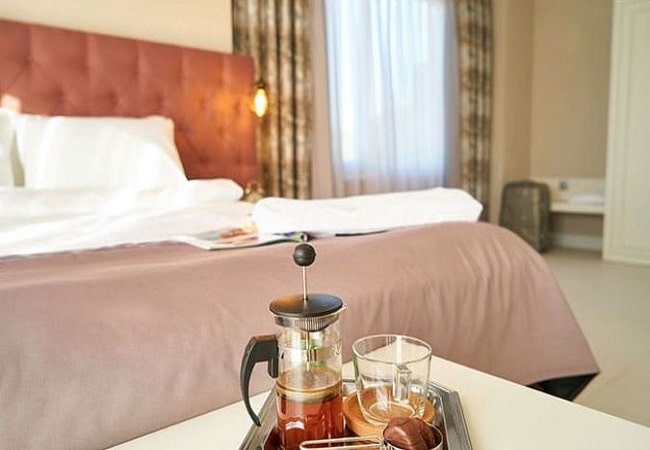Can I Invite Guests to My Hotel Room? Yes, you can invite guests to your hotel room. You can generally invite guests to your hotel room, but it’s essential to be aware of the hotel’s specific policies regarding visitors. Most hotels have guidelines in place to ensure the safety and security of all guests.
Can I Invite Guests to My Hotel Room?
These policies may include registering your guests at the front desk and may have restrictions on the number of visitors or their access to hotel facilities. It’s advisable to check with the hotel’s front desk or consult their guest policy information to understand their rules and any potential additional charges for guests. Respecting the hotel’s policies ensures a pleasant stay for all guests.
Understanding Hotel Policies
When staying in a hotel, it is important to understand the specific policies they have in place. This includes knowing the difference between policies for guests and policies for visitors. Familiarizing yourself with these policies can help ensure a comfortable and enjoyable stay.
- Check-In and Check-Out Times: Most hotels have specific check-in and check-out times. It’s essential to be aware of these times to avoid any additional charges for early check-in or late check-out.
- Smoking Policy: Many hotels are now entirely smoke-free. Be sure to adhere to the hotel’s smoking policy, which may include designated smoking areas.
- Pet Policy: If you’re traveling with pets, check the hotel’s dog policy. Some hotels are pet-friendly, while others have restrictions on the size and number of pets allowed.
- Noise and Quiet Hours: Respect the noise levels in the hotel, especially during designated quiet hours. Excessive noise can disrupt other guests and lead to potential fines.
- Visitors and Guest Policy: Understand the hotel’s policy on inviting guests to your room. There may be restrictions on the number of visitors and access to certain hotel facilities.
- Cancellation Policy: Familiarize yourself with the hotel’s cancellation policy to avoid any charges for last-minute cancellations or no-shows.
- Payment and Deposit Policy: Be aware of the hotel’s payment methods and deposit requirements. Some hotels may require a credit card for incidental charges during your stay.
- Privacy and Security: Respect the privacy and security of other guests. Avoid propping open exterior doors or engaging in any behavior that may compromise security.
- Lost or Damaged Items: Take care of the hotel’s property and report any lost or damaged items promptly. You may be held responsible for any significant damage or missing items.
- Towel and Linen Policy: While it’s common to use towels and linens during your stay, some hotels have policies regarding their frequency of changing. Consider the environment and adhere to these guidelines.
- Food and Beverage Policy: Understand the rules regarding bringing outside food and beverages into the hotel, as some hotels may have on-site dining options and restrictions.
- Pool and Fitness Center Rules: If the hotel has a pool or fitness center, adhere to the posted rules and operating hours.
- Wi-Fi and Internet Access: Check the hotel’s policy on Wi-Fi and internet access, as some hotels offer complimentary access, while others may charge a fee.
It is common for hotels to allow guests to invite visitors to their room, but there may be certain restrictions or guidelines in place. Some hotels may require visitors to register at the front desk or limit the number of visitors allowed in a room.
It is always a good idea to check with the hotel beforehand to avoid any issues or misunderstandings. Understanding and following the hotel’s policies will help create a positive experience for both guests and visitors.
Guest Registration Process
Guest registration is a crucial process in hotels to ensure the safety and security of all occupants. It is important to register all guests staying in a hotel room, even if they are not initially listed on the reservation. This helps the hotel keep track of who is present in their premises at any given time.
The hotel guest registration process is a straightforward and essential part of your stay:
- Arrival: When you arrive at the hotel, approach the front desk or reception area. Most hotels have a designated check-in desk.
- Greeting: The hotel staff will greet you and ask for your reservation details or name to locate your booking.
- Identification: You’ll be asked to provide a valid photo ID and a credit card for incidentals. Some hotels may also require a passport for international guests.
- Reservation Confirmation: The staff will confirm your reservation details, including the room type, length of stay, and any special requests.
- Key Cards: You’ll receive one or more key cards for access to your room. Make sure to keep these cards secure.
- Registration Form: In some cases, you may need to fill out a registration form with your contact information and preferences.
- Payment: If you haven’t paid in advance, the hotel staff will process your payment, which may include room charges and incidentals.
- Welcome and Information: The hotel staff will welcome you, provide information about hotel amenities, meal options, and any events or services during your stay.
- Room Assignment: You’ll be informed of your room number and any necessary directions to reach it.
- Enjoy Your Stay: With your key card and registration completed, you’re ready to head to your room and start enjoying your stay.
Procedures for registering additional guests may vary, but typically involve providing their personal information and identification documents. By registering all guests, hotels can maintain a record of occupancy, comply with legal requirements, and ensure the overall well-being of their guests.
So, if you are planning to invite guests to your hotel room, make sure to follow the guest registration process to guarantee a pleasant and hassle-free stay for everyone involved.
Security And Safety Measures
Hotels take various measures to ensure the security and safety of their guests. Access to guest rooms is restricted to authorized individuals, requiring proper identification upon entry. This is done to protect guests from unauthorized persons and maintain a secure environment.
Hotels also implement surveillance systems, including security cameras and key card access, to monitor and control entry into hotel premises and guest rooms information. In addition, trained security personnel are deployed to continuously monitor the premises, promptly respond to any potential security threats, and ensure that guests feel safe during their stay.
These measures are put in place to provide guests with a secure and pleasant experience, and to give them peace of mind while staying at the hotel.
Hotel Amenities And Extra Charges
When inviting additional guests to your hotel room, it’s important to consider the hotel’s amenities and any potential charges. Accessing these amenities with extra guests may come with additional fees. To avoid surprises, make sure to understand the hotel’s policies and inquire about any fees beforehand.
It’s essential to be mindful of any restrictions or limitations that may apply to guests in terms of access to facilities such as pools, gyms, or complimentary breakfasts. Familiarize yourself with the hotel’s rules regarding guests, as some establishments may limit the number of visitors allowed in a room.
By understanding these potential charges and policies, you can ensure a smooth stay without any unexpected expenses.
Responsibility And Liability
As the primary guest at a hotel, it is important to understand your responsibility in inviting guests to your room. You may wonder whether you have the authority to invite guests and what liabilities you might face in case of damage or misconduct.
It is crucial to remember that as the primary guest, you bear the responsibility for the actions and behaviors of your guests. If any damage occurs to the hotel room or any misconduct takes place, you could be held liable.
It is advisable to thoroughly communicate the hotel’s policies and regulations to your guests and ensure they are aware of their responsibilities as well. By being transparent and proactive in managing your guests, you can minimize potential liabilities and maintain a positive and respectful environment during your stay.
Hosting Visitors In Your Room
Hosting visitors in your hotel room is a common query among travelers. Understanding the distinction between guests and visitors is crucial. While guests are typically individuals staying overnight, visitors refer to those who visit your room temporarily. When it comes to hosting visitors, it’s essential to follow certain guidelines.
Firstly, be respectful of hotel policies regarding visitors. Ensure that your visitors do not disturb other guests. Always inform the front desk about your visitors and ensure they abide by the hotel’s rules. Moreover, limit the number of visitors in your room to avoid overcrowding.
Additionally, be mindful of the noise level and maintain cleanliness. By adhering to these guidelines, you can effectively host visitors in your hotel room without any issues.
Communicating With Hotel Staff
When staying at a hotel and considering whether to invite guests to your room, it is important to communicate with the hotel staff. In order to ensure a smooth experience, it is necessary to obtain the necessary permissions from the hotel staff.
When making reservations or checking in, it is essential to discuss any special requests or concerns with the staff. By clearly conveying your needs, the hotel staff can make necessary arrangements and address any potential issues. Communication is key in maintaining a positive and respectful relationship with the hotel staff, ensuring a pleasant stay for both you and your guests.
Frequently Asked Questions For Can I Invite Guests To My Hotel Room
Can I Invite Someone To My Hotel Room?
Sure, you can invite someone to your hotel room. Keep hotel policies and rules in mind.
Can You Bring Extra Guests To Hotel?
Yes, you can bring extra guests to the hotel.
Can I book a Hotel after midnight?
Yes, you can often book a hotel room after midnight. Many hotels offer 24/7 reservation services, either through their websites, mobile apps, or by calling their front desk.
Keep in mind that if you’re booking for the same night after midnight, availability may be limited, and it’s a good idea to call the hotel directly to confirm room availability and make your reservation. Always check the specific hotel’s reservation policies for accurate information on late-night bookings.
How Many People Can You Invite To A Hotel Room?
Typically, the number of people you can invite to a hotel room is specified by the hotel’s policy.
Can I Invite Guests To My Hotel Room?
Yes, you can invite guests to your hotel room, but there are certain rules and policies you need to follow.
Conclusion
To sum up, inviting guests to your hotel room can be a nice gesture to enhance your stay, but it is crucial to consider the hotel’s policies and regulations beforehand. Always check the occupancy rules, as exceeding the maximum number of guests may result in extra charges or even eviction.
Communicating openly with hotel staff and seeking their guidance can ensure a pleasant experience for both you and your guests. It is also important to respect other guests’ privacy and maintain noise levels to a minimum. Remember, your actions can impact the overall atmosphere of the hotel for fellow guests.
By understanding the hotel’s policies, being respectful to other guests, and communicating effectively, you can enjoy your stay while responsibly inviting guests to your hotel room.




